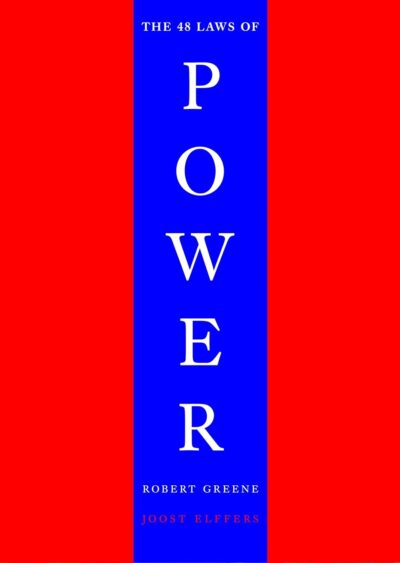63 Results with the "Non-fiction" genre
Adventure Fiction (709)
Biography (409)
Business & Finance (1)
Children's Literature (116)
Comics (6)
Culture (51)
Drama (28)
Dystopian (16)
Fable (86)
Fantasy (663)
Fantasy (63)
Fiction (723)
Finance (16)
Gothic Fiction (12)
Historical Fiction (455)
History (122)
Horror (55)
Lifestyle (36)
Literary (404)
Literary Fiction (167)
Memoir (157)
Mystery (333)
Novel (538)
Paranormal Fiction (96)
Philosophical (161)
Philosophy (45)
Poetry (249)
Political Fiction (11)
Politics (39)
Practical (32)
Psychological Thriller (107)
Relationship (5)
Romance Novel (503)
Romantic Melodrama (14)
Satire (62)
Science (55)
Science Fiction (238)
Self-help (64)
Society (64)
Society (2)
Spiritual Growth (1)
story (2)
Thriller (675)
True Crime (53)
view (11)
Women's Fiction (1)
Young Adult (31)
-
 Law 14 of The 48 Laws of Power highlights the importance of gathering intelligence while maintaining the illusion of trust, making information a crucial asset in securing dominance. Those who master the art of subtle espionage can anticipate threats, manipulate circumstances to their advantage, and ensure that they remain in control. By positioning oneself as a friend while quietly extracting valuable insights, one can use knowledge as a tool for influence and strategy. A compelling…
Law 14 of The 48 Laws of Power highlights the importance of gathering intelligence while maintaining the illusion of trust, making information a crucial asset in securing dominance. Those who master the art of subtle espionage can anticipate threats, manipulate circumstances to their advantage, and ensure that they remain in control. By positioning oneself as a friend while quietly extracting valuable insights, one can use knowledge as a tool for influence and strategy. A compelling…-
215.9 K • Ongoing
-
-
Story
The Boys of Riverside
 The Boys of Riverside by L.B. Johnson follows a group of young boys in a small town as they navigate friendship, identity, and the challenges of growing up. The novel explores themes of loyalty, self-discovery, and the complexities of adolescence.
The Boys of Riverside by L.B. Johnson follows a group of young boys in a small town as they navigate friendship, identity, and the challenges of growing up. The novel explores themes of loyalty, self-discovery, and the complexities of adolescence.-
4.0 K • Jan 23, '25
-
2.3 K • Jan 23, '25
-
2.4 K • Jan 23, '25
-
-
Chapter
52. Starlink
 Starlink emerged as a bold initiative by SpaceX, transforming from a mere concept into a crucial project aimed at reshaping global internet accessibility while generating substantial revenue to support Musk’s long-term vision of Mars colonization. Unlike traditional satellite providers that relied on large, geostationary satellites orbiting 22,000 miles above Earth, Starlink was designed as a low-Earth orbit (LEO) network, positioning thousands of small satellites at just 340 miles. This innovative…
Starlink emerged as a bold initiative by SpaceX, transforming from a mere concept into a crucial project aimed at reshaping global internet accessibility while generating substantial revenue to support Musk’s long-term vision of Mars colonization. Unlike traditional satellite providers that relied on large, geostationary satellites orbiting 22,000 miles above Earth, Starlink was designed as a low-Earth orbit (LEO) network, positioning thousands of small satellites at just 340 miles. This innovative…-
468.2 K • Ongoing
-
-
 In "The 48 Laws of Power," Law 27 delves into the ability to leverage humanity’s innate need for belief and purpose as a pathway to gaining influence and consolidating power. The law advises that by creating a vision or ideology that speaks to people’s longing for meaning, leaders can inspire loyalty and devotion that borders on fanaticism. By presenting oneself as the architect of a grand movement or philosophy, it becomes possible to foster a deep emotional connection with followers, making them not…
In "The 48 Laws of Power," Law 27 delves into the ability to leverage humanity’s innate need for belief and purpose as a pathway to gaining influence and consolidating power. The law advises that by creating a vision or ideology that speaks to people’s longing for meaning, leaders can inspire loyalty and devotion that borders on fanaticism. By presenting oneself as the architect of a grand movement or philosophy, it becomes possible to foster a deep emotional connection with followers, making them not…-
215.9 K • Ongoing
-
-
 Law 4 of The 48 Laws of Power highlights the strategic advantage of saying less than necessary, reinforcing the idea that words should be wielded with precision. Speaking too much not only dilutes the impact of one's statements but also increases the likelihood of saying something regrettable or weakening one's position. Those who master the art of measured speech create an aura of mystery and control, compelling others to fill the silence with their own thoughts and assumptions. A…
Law 4 of The 48 Laws of Power highlights the strategic advantage of saying less than necessary, reinforcing the idea that words should be wielded with precision. Speaking too much not only dilutes the impact of one's statements but also increases the likelihood of saying something regrettable or weakening one's position. Those who master the art of measured speech create an aura of mystery and control, compelling others to fill the silence with their own thoughts and assumptions. A…-
215.9 K • Ongoing
-
-
 Law 38 from Robert Greene’s The 48 Laws of Power underscores the importance of balancing independent thinking with outward conformity to avoid unnecessary hostility or isolation. The law warns that openly displaying one's uniqueness or unconventional beliefs can provoke resentment, suspicion, or even direct opposition from those who feel threatened by non-conformity. Greene argues that while individuality is valuable, it is often wiser to mask personal views, sharing them only with those who are…
Law 38 from Robert Greene’s The 48 Laws of Power underscores the importance of balancing independent thinking with outward conformity to avoid unnecessary hostility or isolation. The law warns that openly displaying one's uniqueness or unconventional beliefs can provoke resentment, suspicion, or even direct opposition from those who feel threatened by non-conformity. Greene argues that while individuality is valuable, it is often wiser to mask personal views, sharing them only with those who are…-
215.9 K • Ongoing
-
-
 Law 16 of The 48 Laws of Power highlights the strategic advantage of making oneself scarce to enhance influence, respect, and desirability. Human nature is such that people often take for granted what is constantly available, while they are drawn to what is rare or elusive. By mastering the art of withdrawal at the right moments, individuals can create an aura of mystery that amplifies their value and keeps others longing for their return. A classic example of this principle is Greta Garbo, the…
Law 16 of The 48 Laws of Power highlights the strategic advantage of making oneself scarce to enhance influence, respect, and desirability. Human nature is such that people often take for granted what is constantly available, while they are drawn to what is rare or elusive. By mastering the art of withdrawal at the right moments, individuals can create an aura of mystery that amplifies their value and keeps others longing for their return. A classic example of this principle is Greta Garbo, the…-
215.9 K • Ongoing
-
-
 Revenge of the Tipping Point by Steven J. Bickel follows a group of unlikely heroes uncovering a global conspiracy that threatens to plunge society into chaos. The novel explores the power of small actions and the unpredictable consequences of tipping points in both personal and political realms.
Revenge of the Tipping Point by Steven J. Bickel follows a group of unlikely heroes uncovering a global conspiracy that threatens to plunge society into chaos. The novel explores the power of small actions and the unpredictable consequences of tipping points in both personal and political realms.-
4.5 K • Jan 23, '25
-
4.5 K • Jan 23, '25
-
Chapter 9: Overstories, Superspreaders, and Group Proportions “OxyContin is our ticket to the moon.”5.4 K • Jan 23, '25
-
-
Chapter
53. Starship
 Starship was born out of Elon Musk’s deep-rooted aspiration to make humanity an interplanetary species, a goal that required a spacecraft far beyond the capabilities of the Falcon 9 and Falcon Heavy. While those rockets had revolutionized spaceflight through reusability, they were ultimately insufficient for the scale of Mars colonization that Musk envisioned. In response, he launched an ambitious project originally called the BFR (Big F**king Rocket), later rebranded as Starship, a fully reusable rocket…
Starship was born out of Elon Musk’s deep-rooted aspiration to make humanity an interplanetary species, a goal that required a spacecraft far beyond the capabilities of the Falcon 9 and Falcon Heavy. While those rockets had revolutionized spaceflight through reusability, they were ultimately insufficient for the scale of Mars colonization that Musk envisioned. In response, he launched an ambitious project originally called the BFR (Big F**king Rocket), later rebranded as Starship, a fully reusable rocket…-
468.2 K • Ongoing
-
-
 If uncertainty clouds your decision-making, it is often better to pause rather than move forward hesitantly, as indecision can unravel even the most well-laid plans. In contrast, boldness commands respect, masks shortcomings, and creates the impression of confidence and control. LAW 28 highlights this principle by demonstrating how mistakes made from audacious actions are not only easier to recover from but are often admired for their courage, while cautious inaction breeds regret and missed opportunities.…
If uncertainty clouds your decision-making, it is often better to pause rather than move forward hesitantly, as indecision can unravel even the most well-laid plans. In contrast, boldness commands respect, masks shortcomings, and creates the impression of confidence and control. LAW 28 highlights this principle by demonstrating how mistakes made from audacious actions are not only easier to recover from but are often admired for their courage, while cautious inaction breeds regret and missed opportunities.…-
215.9 K • Ongoing
-
- Previous 1 … 4 5 6 7 Next
